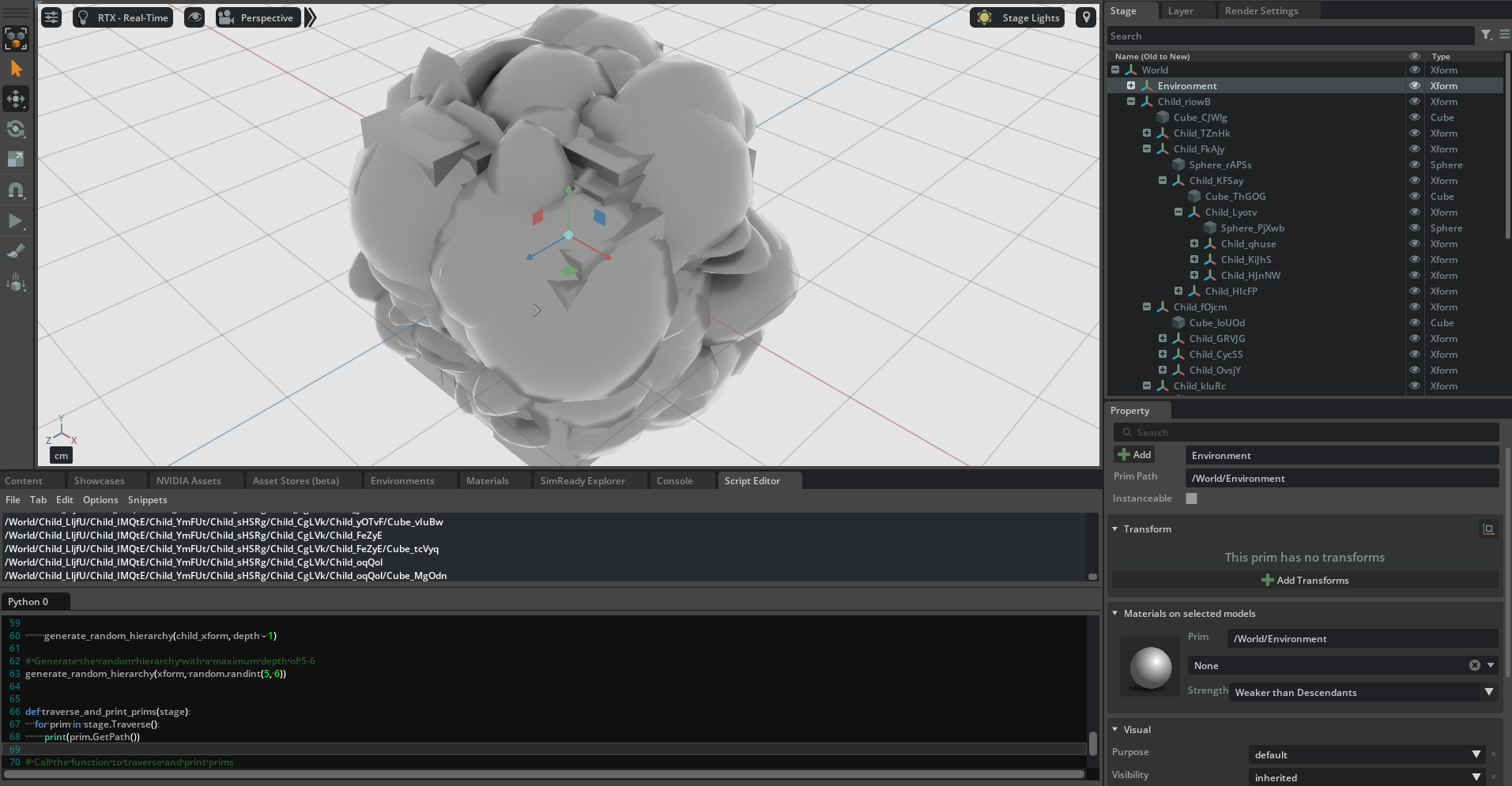Traversing
Traversing means ‘scanning’ all (or a subset of) the prims on a stage.
The simplest form of traversal is:
def traverse_and_print_prim_paths(stage):
for prim in stage.Traverse():
print(prim.GetPath())
traverse_and_print_prim_paths(stage)
You can test this out by generating a random scene hierarchy of prims (this is mostly boilerplate code)

from pxr import Sdf, UsdGeom, Usd, UsdLux, Gf
import omni.usd
import carb
import random
import string
# Function to generate a random identifier and make the sibling prim names unique
def generate_random_identifier(length=5):
return ''.join(random.choice(string.ascii_letters) for _ in range(length))
BASE_DIRECTORY = "/tmp" # This is where the .usda files will be saved
stage : Usd.Stage = Usd.Stage.CreateInMemory("RootLayer.usda")
xform : UsdGeom.Xform = UsdGeom.Xform.Define(stage, Sdf.Path("/World"))
environment_xform = UsdGeom.Xform.Define(stage, "/World/Environment")
dome_light = UsdLux.DomeLight.Define(stage, "/World/Environment/DomeLight")
dome_light.CreateIntensityAttr(1000)
# Function to generate a random scene hierarchy
def generate_random_hierarchy(parent_xform, depth):
if depth <= 0:
return
for _ in range(random.randint(1, 4)): # Randomly choose 1 to 4 children
child_name = "Child_" + generate_random_identifier() # Add a random identifier
child_xform = UsdGeom.Xform.Define(stage, parent_xform.GetPath().AppendChild(child_name))
if random.choice([True, False]): # Randomly choose to add cube or sphere
shape_name = "Cube_" + generate_random_identifier() # Add a random identifier
cube = UsdGeom.Cube.Define(stage, child_xform.GetPath().AppendChild(shape_name))
extent = [(random.uniform(-50, 50), random.uniform(-50, 50), random.uniform(-50, 50)),
(random.uniform(-50, 50), random.uniform(-50, 50), random.uniform(-50, 50))]
cube.GetExtentAttr().Set(extent)
cube.GetSizeAttr().Set(random.uniform(10, 100))
# Add random small offsets from the center
offset = Gf.Vec3d(random.uniform(-100, 100), random.uniform(-100, 100), random.uniform(-100, 100))
cube_center = Gf.Vec3d(0, 0, 0) # Center of the scene
cube_center += offset
UsdGeom.Xformable(cube.GetPrim()).AddTranslateOp().Set(cube_center)
else:
shape_name = "Sphere_" + generate_random_identifier() # Add a random identifier
sphere = UsdGeom.Sphere.Define(stage, child_xform.GetPath().AppendChild(shape_name))
extent = [(random.uniform(-50, 50), random.uniform(-50, 50), random.uniform(-50, 50)),
(random.uniform(-50, 50), random.uniform(-50, 50), random.uniform(-50, 50))]
sphere.GetExtentAttr().Set(extent)
# Add random small offsets from the center
offset = Gf.Vec3d(random.uniform(-100, 100), random.uniform(-100, 100), random.uniform(-100, 100))
sphere_center = Gf.Vec3d(0, 0, 0) # Center of the scene
sphere_center += offset
UsdGeom.Xformable(sphere.GetPrim()).AddTranslateOp().Set(sphere_center)
UsdGeom.Xformable(sphere.GetPrim()).AddScaleOp().Set(Gf.Vec3d(random.uniform(10, 100),
random.uniform(10, 100),
random.uniform(10, 100)))
generate_random_hierarchy(child_xform, depth - 1)
# Generate the random hierarchy with a maximum depth of 5-6
generate_random_hierarchy(xform, random.randint(5, 6))
# Traversal!
####################################
def traverse_and_print_prim_paths(stage):
for prim in stage.Traverse():
print(prim.GetPath())
traverse_and_print_prim_paths(stage)
####################################
stage.GetRootLayer().Export(BASE_DIRECTORY + "/RootLayer.usda")
omni.usd.get_context().open_stage(BASE_DIRECTORY + "/RootLayer.usda")
Other common ways of scanning prims is by searching for specific types of prims (e.g. of Sphere type)
from typing import List, Type
def find_prims_by_type(stage: Usd.Stage, prim_type: Type[Usd.Typed]) -> List[Usd.Prim]:
found_prims = [x for x in stage.Traverse() if x.IsA(prim_type)]
return found_prims
prims: List[Usd.Prim] = find_prims_by_type(stage, UsdGeom.Sphere)
print(prims)
There are also UsdPrim::GetChild functions and UsdPrim::GetChildren() and UsdPrim::GetAllChildren() (the former returns the active, loaded, defined and non-abstract children of a prim, the latter returns any child).
Instance traversals
Recall that normal traversals don’t work with instances, in case you need to traverse instance proxies, you should use Usd.TraverseInstanceProxies
from pxr import Sdf, UsdGeom, Usd, UsdLux, Gf
import omni.usd
import carb
BASE_DIRECTORY = "/tmp" # This is where the .usda files will be saved
parking_lot_stage : Usd.Stage = Usd.Stage.CreateInMemory("ParkingLot.usda")
car_stage : Usd.Stage = Usd.Stage.CreateInMemory("Car.usda")
# Car stage
xform : Usd.Prim = car_stage.DefinePrim(Sdf.Path("/Car"))
xform.GetPrim().CreateAttribute("color", Sdf.ValueTypeNames.Color3f).Set(Gf.Vec3f(0, 0, 0))
body : UsdGeom.Mesh = UsdGeom.Mesh.Define(car_stage, Sdf.Path("/Car/Body"))
body.GetPrim().CreateAttribute("color", Sdf.ValueTypeNames.Color3f).Set(Gf.Vec3f(0, 0, 0))
Door : UsdGeom.Mesh = UsdGeom.Mesh.Define(car_stage, Sdf.Path("/Car/Door"))
car_stage.GetRootLayer().Export(BASE_DIRECTORY + "/Car.usda")
# Parking Lot stage
xform : Usd.Prim = parking_lot_stage.DefinePrim(Sdf.Path("/ParkingLot"))
car1_prim : Usd.Prim = parking_lot_stage.DefinePrim("/ParkingLot/Car_1")
loaded_layer = Sdf.Layer.FindOrOpen(BASE_DIRECTORY + "/Car.usda")
car1_prim.GetReferences().AddReference(loaded_layer.identifier, "/Car")
car2_prim : Usd.Prim = parking_lot_stage.DefinePrim("/ParkingLot/Car_2")
loaded_layer = Sdf.Layer.FindOrOpen(BASE_DIRECTORY + "/Car.usda")
car2_prim.GetReferences().AddReference(loaded_layer.identifier, "/Car")
car3_prim : Usd.Prim = parking_lot_stage.DefinePrim("/ParkingLot/Car_3")
loaded_layer = Sdf.Layer.FindOrOpen(BASE_DIRECTORY + "/Car.usda")
car3_prim.GetReferences().AddReference(loaded_layer.identifier, "/Car")
# Mark with metadata Car_1 and Car_2 as instanceable, i.e. "these reference prims can be reused"
# while Car_3 is not marked
car1_prim.SetInstanceable(True)
car2_prim.SetInstanceable(True)
# Traversal!
####################################
# This will only return non-instance prims
# def traverse_and_print_prim_paths(stage):
# for prim in stage.Traverse():
# print(prim.GetPath())
# traverse_and_print_prim_paths(parking_lot_stage)
# This will allow you to traverse instanced prims thanks to instance proxies!
def traverse_and_print_all_prim_paths(stage):
for prim in stage.Traverse(Usd.TraverseInstanceProxies()):
print(prim.GetPath())
traverse_and_print_all_prim_paths(parking_lot_stage)
####################################
# Export root layer to file
parking_lot_stage.GetRootLayer().Export(BASE_DIRECTORY + "/ParkingLot.usda")
omni.usd.get_context().open_stage(BASE_DIRECTORY + "/ParkingLot.usda")